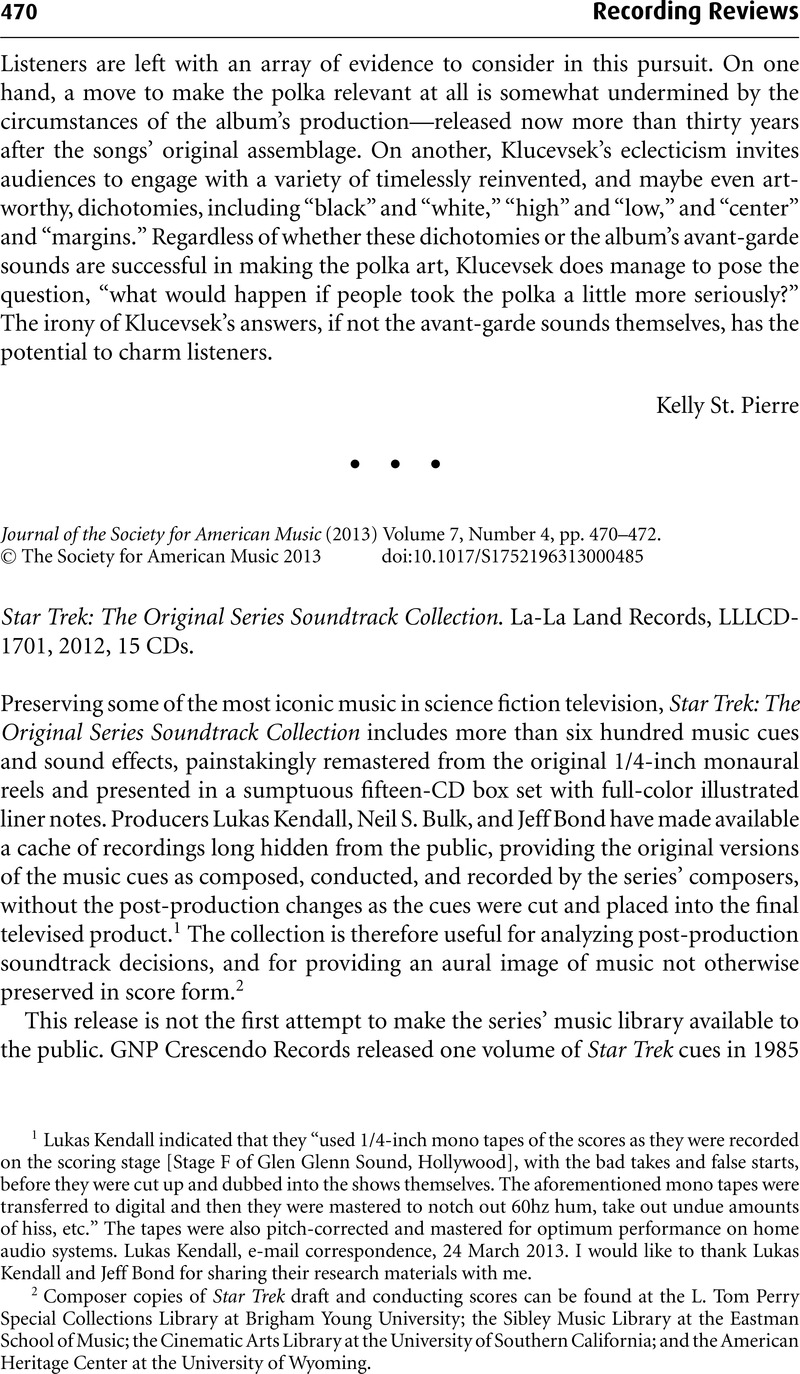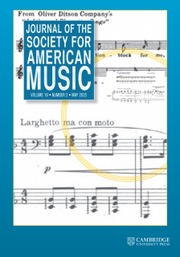No CrossRef data available.
Article contents
Star Trek: The Original Series Soundtrack Collection. La-La Land Records, LLLCD-1701, 2012, 15 CDs.
Published online by Cambridge University Press: 31 October 2013
Abstract

- Type
- Recording Reviews
- Information
- Copyright
- Copyright © The Society for American Music 2013
References
1 Lukas Kendall indicated that they “used 1/4-inch mono tapes of the scores as they were recorded on the scoring stage [Stage F of Glen Glenn Sound, Hollywood], with the bad takes and false starts, before they were cut up and dubbed into the shows themselves. The aforementioned mono tapes were transferred to digital and then they were mastered to notch out 60hz hum, take out undue amounts of hiss, etc.” The tapes were also pitch-corrected and mastered for optimum performance on home audio systems. Lukas Kendall, e-mail correspondence, 24 March 2013. I would like to thank Lukas Kendall and Jeff Bond for sharing their research materials with me.
2 Composer copies of Star Trek draft and conducting scores can be found at the L. Tom Perry Special Collections Library at Brigham Young University; the Sibley Music Library at the Eastman School of Music; the Cinematic Arts Library at the University of Southern California; and the American Heritage Center at the University of Wyoming.
3 The Crescendo collection includes a total of 108 cues, whereas the Varèse collection includes sixty-eight cues. Star Trek: Original Series Soundtrack, Vol. 1, GNP Crescendo Records GNPD 8006, 1985; Star Trek: Original Series Soundtrack, Vol. 2, GNP Crescendo Records GNPD 8025, 1992; Alexander Courage and Gerald Fried, Star Trek: Original Series Soundtrack, Vol. 3, GNP Crescendo Records GNPD 8030, 1992; Star Trek: Newly Recorded Music from Selected Episodes of the Paramount TV Series, Vol. 1, Royal Philharmonic Orchestra, cond. Fred Steiner, Varèse Sarabande Records VSD 47235, 1990; Star Trek: Newly Recorded Music from Selected Episodes of the Paramount TV Series, Vol. 2, Royal Philharmonic Orchestra, cond. Fred Steiner, Varèse Sarabande Records VSD 47240, 1990.
4 Several of these episodes were partially scored, using both original music and tracked cues.
5 Gerald Fried, interview by Fred Steiner, 16 April 1982, transcript, Fred Steiner Papers, 1975–1981, MSS 2193, “Star Trek Interviews,” L. Tom Perry Special Collections, Harold B. Lee Library, Brigham Young University, Orem, UT.
6 Roddenberry indicated to his assistant producer, Robert Justman, that he did not want a traditional electronic science fiction score for Star Trek. Although the series did occasionally employ a synthesizer, an electric violin, an electric guitar, etc., it did so sparingly. Robert Justman, interview by Fred Steiner, 28 April 1982, transcript, Fred Steiner Papers.
7 Jack Hunsaker, interview by Fred Steiner, 27 April 1982, cassette recording, Fred Steiner Papers, Box 55, Case 1, “Jack Hunsaker”; Alexander Courage Collection, “Original Main Title (Revised),” SC 1995.10, Box 39, Folder 8, Ruth T. Watanabe Special Collections, Sibley Music Library, Eastman School of Music, Rochester, NY.
8 This collection also includes arrangements of the end-title music using this alternate instrumentation.
9 Union rules did not allow for the re-use of music past the show's current season unless it was re-recorded. Jack Hunsaker, interview by Fred Steiner, 27 April 1982, transcription, Fred Steiner Papers, “Star Trek Interviews.”
10 Bond, Jeff, The Music of Star Trek: Profiles in Style (Los Angeles: Lone Eagle Publishing Company, 1999)Google Scholar. Bond's book covers not only the original series of Star Trek, but also the music of the franchise's films and television series through 1999, including all films from Star Trek: The Motion Picture (1979) to Star Trek: Nemesis (2002) and all series from Star Trek (1966–69) to Star Trek: Voyager (1995–2002), excluding the animated series (1973–74).
11 I provided Kendall and Bond with research I collected in 2011 from the Fred Steiner Collection at Brigham Young University. Most of what the liner notes include from this material draws from interviews Fred Steiner conducted as he prepared a scholarly essay on the music of Star Trek in 1982: Steiner, Fred, “Keeping Score of the Scores: Music for Star Trek,” in Quarterly Journal of the Library of Congress 40/1 (Winter 1983): 4–15Google Scholar. An expanded version of this article was printed as “Music for Star Trek: Scoring a Television Show in the Sixties,” in Wonderful Inventions: Motion Pictures, Broadcasting, and Recorded Sound at the Library of Congress, ed. Iris Newsome (Washington, D.C.: The Library, 1985), 286–309.




